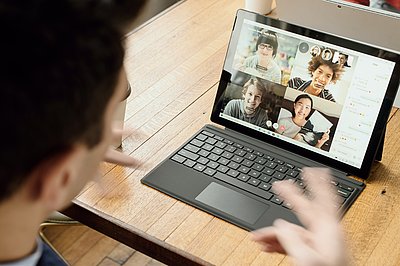How you will Study

Digital Learning and Teaching Formats
All courses and examinations are offered entirely online and can be taken remotely. No physical presence in Giessen is required. If you wish physical presence in Giessen during your studies, you have the option to attend courses of the summer school which can be recognized for your degree programme.
The curriculum of the study programme is realised via several online learning and teaching scenarios. We distinguish between the following forms of instruction: lectures, tutorials, seminars or projects. Please be aware of the fact that modules or parts of modules which are carried out as seminars, or projects, may require regular virtual attendance in, for instance, synchronous video conferences as a prerequisite of your examination. However, lecturers will aim at offering time slots for synchronous modes of instruction to accommodate different time zones. Examination formats comprise seminar papers, written or oral examinations, presentations, project work, assignments or other preliminary forms of examination during the semester. Your lecturers will provide you with the details on the module realisation by providing a syllabus at the beginning of each semester.
E-Learning Elements

For synchronous scenarios, lecturers may use Webex to facilitate discussions, presentations, etc. Files, links and questions can be shared during live meetings via the chat function. Breakout rooms allow for teamwork and discussions within your peer group. Additionally, Microsoft Teams (MS Teams) is used at JLU for the delivery of live broadcasts. Moreover, it supports the collaboration in designated teams parallel to and beyond a live broadcast. Thus, you can share files, collaborate with fellow students and chat.
In addition, Stud.IP and ILIAS are used as learning management systems (LMS). Our LMS will help support the facilitation of asynchronous online learning scenarios. Stud.IP will provide access to study material uploaded by lecturers. It also enables communication between students and lecturer, provides information on the course and its administration. In addition, the LMS ILIAS is used for granting students access to study material. It may offer e-lectures, exercises, tests and other interactive elements for teaching and learning, such as peer-reviews, portfolios, etherpads, wikis or weblogs. Your lecturer will inform you in advance on the use of the respective LMS, the provided learning contents and e-learning activities in his or her class.
Do you already have questions regarding the electronic systems and educational technologies used at JLU? Check out the respective FAQ section of the Digital Campus.